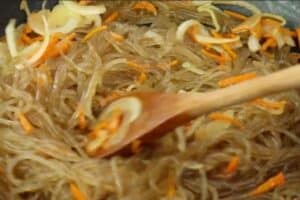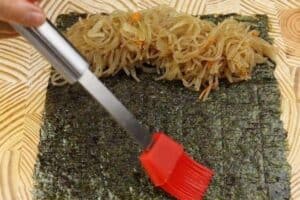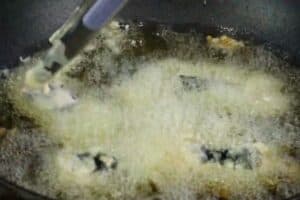however, you can now try making them at home with a few simple ingredients ! Our tested and tested recipe will give you an authentic taste of Korean street food at home plate. Learn more about how you can make this popular nosh below .
 Gimmari | Image from Instagram
Gimmari | Image from Instagram
What is Kimari?
Kimari ( gimmari or gimari ) is a popular korean nosh that you will find in street stalls and nox markets. These deep fried seaweed rolls are a coarse street food like Korean corn dogs ! They are made from season glass noodles wrapped in seaweed. then, they are coated in a light batter that is french-fry until aureate brown .
It can be served on its own or with any gimari sauce of your choice. furthermore, you can make homemade korean french-fry rolls with just a few simple ingredients.
 Korean fried seaweed roll | Image from Instagram
Korean fried seaweed roll | Image from Instagram
How do you eat gimari?
Gimari can be eaten on its own or with your favorite dipping sauce of choice. But, Koreans will most normally eat this with tteokbokki, a hot rice cake smasher .
Locals will normally eat korean deep fried seaweed leap rolls by pass or using chopsticks. As gimmari is relatively mess-free and easy to eat on the die, they are democratic street stalls in Seoul .
 Gimmari and Tteokbokki combination | Image from Instagram
Gimmari and Tteokbokki combination | Image from Instagram
What do you eat with Gimmari?
Tteokbokki is normally eaten with gimmari. Tteokbokki is a quintessential dish that is found in nosh bars, fast food restaurants, and street stalls throughout South Korea. The convenience and cheap price of tteokbokki make the cup of tea highly popular among students and tourists .
Kimari and tteokbokki are often eaten together to complement the chewy texture of the rice cake. This is because, gimari provides an addicting crush that is savory and comforting. meanwhile, tteokbokki is frequently packed with noodles ( to make rabokki ), lunch meat, sausages, and boiled eggs .
 Fried seaweed roll, Tteokbokki meal | Image from Instagram Tteokbokki is often served with battered and french-fry foods called twigim. Twigim consists of respective tempura-battered vegetables, dumplings, squid, runt, and of path, kimari. The tteokbokki and gimari are dipped into the sauce that makes the perfect combination of angelic, salty, and piquant .
Fried seaweed roll, Tteokbokki meal | Image from Instagram Tteokbokki is often served with battered and french-fry foods called twigim. Twigim consists of respective tempura-battered vegetables, dumplings, squid, runt, and of path, kimari. The tteokbokki and gimari are dipped into the sauce that makes the perfect combination of angelic, salty, and piquant .
While you are cooking up your seaweed give rolls, make yourself a batch of fried seaweed chips. This is another cover that can be made with nori seaweed. Simply cut your nori sheets into bite-size pieces and batter them. then, fry until aureate brown .
 Nori Seaweed Fried seaweed chips are a simple bite that you can make in a few minutes. furthermore, this bite besides has many nutritional benefits owing to the healthy nori component. therefore, we recommend you making this bite both kids and adults will enjoy .
Nori Seaweed Fried seaweed chips are a simple bite that you can make in a few minutes. furthermore, this bite besides has many nutritional benefits owing to the healthy nori component. therefore, we recommend you making this bite both kids and adults will enjoy .
Gimari Calories
Each korean cryptic fried seaweed spring roll is approximately 50 calories per while. Our gimmari recipe below yields 16 roll pieces .
Ingredients
Nori sheets and korean glass noodles are the key ingredients in our kimari recipe. fortunately, these ingredients can be found at your local anesthetic asian grocery store store or purchased on-line !
The noodles are coated in a sauce that makes for a simplified version of a delicious smasher called japchae. Japchae is a stir-fried glass noodle dish. It normally includes the addition of assorted vegetables like carrots and spinach. Hence, kimari makes it possible to enjoy this sit down attic dish in sting sizes !

Kimari (Korean Fried Seaweed Roll)
Kimari is a popular Korean deep fried seaweed roll that is made by rolling glass noodles into nori sheets. The seaweed rolls are then deep-fried for a crispy coating. Learn how to make this addicting Korean street food at home. Gimmari can be eaten as an appetizer or snack. Continue to the recipe below to have an authentic taste of Korean street food in the comfort of your home!
Author:
Honest Food Talks
5
from
18
votes
Print
Pin
Servings:
4
servings
Calories:
237
kcal
Prep Time:
10
minutes
Cook Time:
10
minutes
Total Time:
20
minutes
Ingredients
- 8 sheets dried seaweed sheets cut into halves
- 4 oz glass noodles
- ⅓ pcs carrot
- 10 stalks garlic chives
- cooking oil for deep fry
Gimmari Sauce
- 1 tablespoon soy sauce
- ¼ teaspoon sesame oil
- 1 teaspoon salt
- 1 teaspoon pepper
Kimari Batter
- ½ cup all-pupose flour
sifted
- ½ cup potato starch or corn starch, sifted
- ¼ teaspoon salt
- ¾ cup water
Instructions
-
Begin by boiling the glass noodles according to the package instructions. Cut into finger-length pieces and combine with the julienned carrots and garlic chives.

-
Season the noodles with soy sauce, salt, sesame oil, and black pepper. Mix thoroughly until noodles and vegetables are coated in the sauce. Let it cool for a few minutes after cooking.

-
Place a small amount of the noodle and vegetable mixture onto the nori seaweed sheet, arranging it into a row before rolling it. Brush some water on the edge of the nori sheet to allow it to stick as you seal it. Cut them into smaller bite-size pieces.

-
Combine all the batter ingredients in a separate bowl. Gently drop your seaweed roll into the batter to coat it.

-
Prepare the oil by heating it up to 180°C (or 360°F) in a non-stick pan. Drop your battered nori rolls into the oil and fry for around two to three minutes. Allow your deep-fried seaweed rolls to drain on a piece of kitchen towel.

-
Serve the kimari hot on its own or as an accompaniment to tteokbokki.
Notes
- To make sure the noodles do not stick to one another, do not rinse them after boiling.
- To make the rolling of the noodles easier, let the noodles cool down after cooking. By doing this, the noodles will harden slightly and make it easier to roll.
- Glass noodles are also sometimes called sweet potato starch noodles or dangmyeon .
Nutrition
Calories:
237
kcal
Carbohydrates:
54
g
Protein:
4
g
Fat:
1
g
Sodium:
1006
mg
Potassium:
248
mg
Fiber:
2
g
Sugar:
1
g
Vitamin A:
131
IU
Vitamin C:
2
mg
Calcium:
38
mg
Iron:
2
mg
Calories have been calculated using an on-line calculator. nutritional information offered on Honest Food Talks is for general information purposes and are merely pugnacious estimations .
Tried this recipe ? Follow us @ honestfoodtalks for more delicious recipes ! K-makan Youtube impart made an easy-to-follow video recipe on how to make this serve. however, they added some onions in the attic stir-fry and an testis in the batter to differentiate their recipe .
Gimmari : 김말이
Watch this video on YouTube
Air Fryer Version
If you prefer, you can besides prepare gimari using an publicize fryer. This would remove the motivation to prepare a large sum of anoint in a pan for deep frying. To achieve this, do the stick to .
- Line your air fryer tray with parchment paper. If not using parchment paper, oil your air fryer basket to prevent sticking.
- Batter your nori seaweed spring rolls and place them into the air fryer basket. Drizzle oil on top of your rolls or use an oil spray for an even coat.
- Then, air fry your rolls at about 200°C (or 390°F ) for 5 minutes, or until golden brown.
- Turn the kimari pieces over and air fry for another 5 minutes.
- Serve immediately.
Storing Tips
Gimmari is best consumed immediately after cooking. however, gimmari can be stored in the electric refrigerator for 2-3 days. In addition, we recommend wrapping the electrocute seaweed rolls in plastic wrap and storing them in an airtight container. Reheat the fry rolls in the air fryer with a drizzle of petroleum or fry once more for brittleness .
 Gimari with hot chili sauce | Image from Instagram
Gimari with hot chili sauce | Image from Instagram
How do you cook frozen seaweed rolls?
With tune fryers becoming a staple creature in kitchens, kimari can well be prepared using the breeze fryer. however, they can besides be prepared by frying in cooking oil until fortunate brown.
For those looking for another choice, they can besides be prepared in an oven. Lay the frozen gimmari on a parchment-lined tray and bake for 10-12 minutes at 375°F ( about 190°C ) .
however, for pre-packed freeze korean cryptic fried seaweed spring rolls, follow the instructions on the package .
Did you try making your own gimmari at home ? Take a picture and share it with us on Instagram @ honestfoodtalks. We would love to see your delightful rolls !






